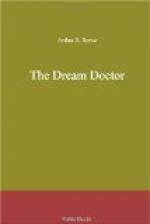It was indeed an awesome thing. It represented a woman in the robes of an Egyptian priestess, a woman of medium height, with an inscrutable face. The slanting Egyptian eyes did, as Miss White had said, almost literally stare through you. I am sure that any one possessing a nature at all affected by such things might after a few minutes gazing at them in self-hypnotism really convince himself that the eyes moved and were real. Even as I turned and looked the other way I felt that those penetrating eyes were still looking at me, never asleep, always keen and searching.
There was no awe about Kennedy. He carefully pushed aside the lid and peered inside. I almost expected to see some one in there. A moment later he pulled out his magnifying-glass and. carefully examined the interior. At last he was apparently satisfied with his search. He had narrowed his attention down to a few marks on the stone, partly in the thin layer of dust that had collected on the bottom.
“This was a very modern and material reincarnation,” he remarked, as he rose. “If I am not mistaken, the apparition wore shoes, shoes with nails in the heels, and nails that are not like those in American shoes. I shall have to compare the marks I have found with marks I have copied from shoe-nails in the wonderful collection of M. Bertillon. Offhand, I should say that the shoes were of French make.”
The library having been gone over next without anything attracting Kennedy’s attention particularly, he asked about the basement or cellar. Dr. Lith lighted the way, and we descended.
Down there were innumerable huge packing-cases which had just arrived from abroad, full of the latest consignment of art treasures which Spencer had purchased. Apparently Dr. Lith and Miss White had been so engrossed in discovering what damage had been done to the art treasures above that they had not had time to examine the new ones in the basement.
Kennedy’s first move was to make a thorough search of all the little grated windows and a door which led out into a sort of little areaway for the removal of ashes and refuse. The door showed no evidence of having been tampered with, nor did any of the windows at first sight. A low exclamation from Kennedy brought us to his side. He had opened one of the windows and thrust his hand out against the grating, which had fallen on the outside pavement with a clang. The bars had been completely and laboriously sawed through, and the whole thing had been wedged back into place so that nothing would be detected at a cursory glance. He was regarding the lock on the window. Apparently it was all right; actually it had been sprung so that it was useless.
“Most persons,” he remarked, “don’t know enough about jimmies. Against them an ordinary door-lock or window-catch is no protection. With a jimmy eighteen inches long even an anaemic burglar can exert a pressure sufficient to lift two tons. Not one window in a thousand can stand that strain. The only use of locks is to keep out sneak-thieves and compel the modern scientific educated burglar to make a noise. But making a noise isn’t enough here, at night. This place with all its fabulous treasures must be guarded constantly, now, every hour, as if the front door were wide open.”




